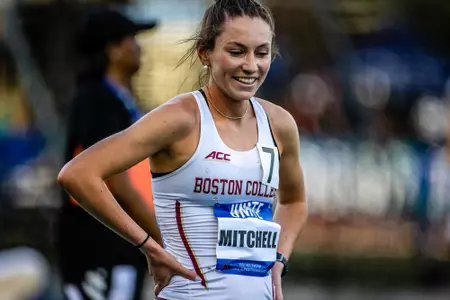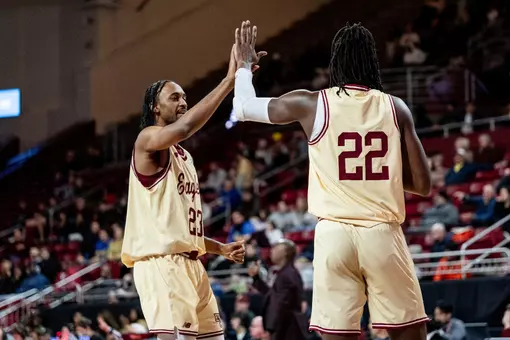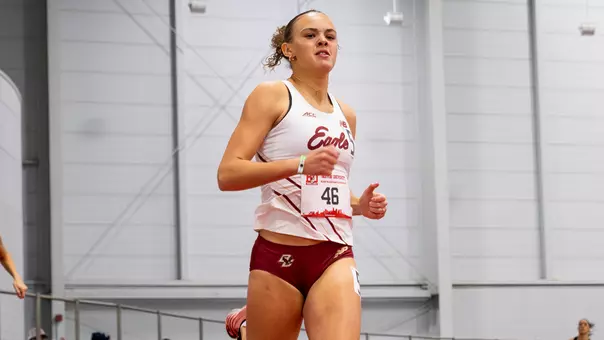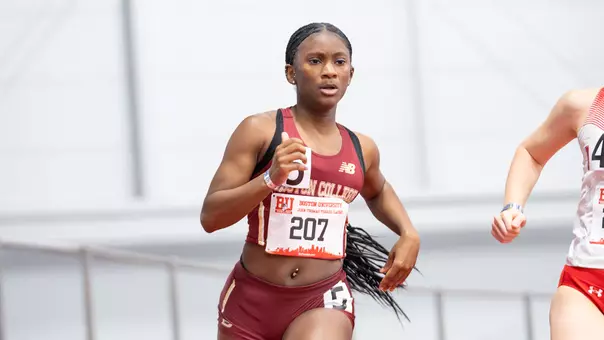
Photo by: Tom Connelly
Mitchell To Cap Record-Setting Season At Historic Hayward Field
June 08, 2022 | Women's Track & Field, #ForBoston Files
The Eagles' track standout will compete in the semifinals of the 800m on Thursday night in Eugene, Ore.
CHESTNUT HILL, Mass. -- Eugene, Oregon is synonymous as one of the true world capitals of the sport of track and field. "Tracktown" and its main tenant at the University of Oregon carries the weight of nearly three dozen national championships under the watchful eyes of legendary head coaches. Earning an opportunity to compete at Hayward Field, the Ducks' newly renovated home stadium, is considered an honor in the track world. The privilege links the current crop of runners, jumpers and throwers to the historic names of the past.
Earning that qualification requires a unique brand of hard work. It isn't given out and is instead taken by those strong enough to power through the requisite adversity. They all have stories that are intensely personal, and on Thursday, Boston College's Katherine Mitchell will add her name to the wall of runners who cross the threshold at Hayward Field when she competes in the 800m run at the 2022 NCAA Outdoor Track and Field Championship.
"The 800 is truly the middle distance event," said interim head coach Julie Heyde. "It has crossover from the distance athletes with the sprint athletes, and it kind of perfectly fits right in the middle. This year, Kate had the strongest fall she's ever had, so her foundation of training and her mileage was much higher. She's had better tempo work and her long runs stayed consistent. She was able to double back into a 4x400-meter relay after she'd done a race like the 800, the 1,500, or even the mile, and running with that full foundation really set her up to run the 800 well."
As a sport, track is broken down into three different seasons: cross country, indoor and outdoor. Each has their own distinct characteristics, but the collective group retains a natural flow that pushes one into another for distance runners who participate in all three. An overlap occurs when cross country hits the winter indoor season, with another happening during the spring thaw when runners head outside.
Training follows the same platitude and allows runners to log miles through both their individual and collective pathways. They race for each sport, but they continually tailor and tinker for each sport's unique calling. That action subsequently builds a base that allows them to hit their stride at the end of the year when they move back outdoors and into familiar surroundings.
It's a process, but it came together this year when Mitchell ran all three seasons for the first time in her career. She had always been strong as a middle distance runner in the indoor and outdoor seasons, but her cross country season pushed her into exponential breakaways during the winter and spring after BC was able to run a full schedule for the first time in three years.
She placed second in the Open 5K at the Battle in Beantown and first in a five-kilometer, sub-varsity race at the New England Championship during the fall, then used the performances to launch a record-setting winter season that included a new school record in the 1,000-meter run. One month later, she clocked the third-best time in school history in the 800. Later, her 1,200-meter leg opened a distance medley relay that set a new school record during the ACC Championship, a meet during which she individually finished sixth in the 800.
"Having the strong base from the fall was really helpful," said Mitchell this week, "and the 800 is one of those races that's become a long sprint more than a short distance event. So having that strong base from the fall was really helpful because I continued to work on that base through the indoor season. That was a little challenging because we didn't have a track to be on, but getting out into the spring, still having that base, the endurance was built up. That allowed me to work on speed and mechanics to tighten the screws."
Each stage seemingly discovered new heights, and she caught fire by running different events geared towards continued, overall success. She started the Raleigh Relays with a top-25 finish in the 1,500-meter run and returned to the track one day later to finish seventh in the 800, a place that improved to third two weeks later at the Larry Ellis Invite. By May, she was ranked as one of the top runners in the ACC, and after winning her qualifying heat in the 800m in a time of 2:06.69, she clocked the third-fastest time in BC history in the conference championship, placing second in a time of 2:04.09.
"This whole year has been a process of everything coming together," Mitchell said. "I've had a rough three years with injuries, COVID-19, stuff like that, so for me, this was the first year where I had a solid fall and a solid winter. I think that led to me being able to have a great spring with great fitness under me."
"A lot of it truly has to do with training," Heyde said. "Being able to put on spikes and train in an outdoor setting, she was able to go as fast as she needed to in training. The 800 during indoor season is often slower because it's a smaller track and so much tighter. Once you cut-in, there's more people on top of each other. That's different from outdoor track, where it's a little more spread out. The times can come down a little bit more just by having that space."
Mitchell has shown a veteran's ability to maneuver through the trial heats and finals through both the ACC Championship and NCAA East Preliminary round. She punched her ticket to Eugene on May 28 by finishing third in a quarterfinals heat last week at Indiana's Robert C. Haugh Complex, earning an automatic advancement in a time of 2:04.53.
"If you look at how I've performed, it was really emotional to finish second this year and be close to [first] by less than half of a second," she said. "I've known I had it in me, but it's been frustrating to not perform. But this year, it's been great to see everything come together"
Still, nothing compares to the possible heights facing her this week at one of running's holiest cathedrals. Her heat is the first of three semifinals and includes three runners capable of threatening the two-minute barrier, but even in an all-out sprint, she knows there is strategy involved that could catapult into the championship finals.
"A lot of championship racing involves tactical freedom," Mitchell said. "For me, recognizing my strengths and weaknesses involve reading the race that's going on around me and understanding if I can take control or wait to move. [Assistant coach] Anna Willard, my coach, has been to Oregon during her own collegiate and professional career, so she's given me the information on what to expect. We want to have that moment during open hours to see just what everything looks like for the stadium and the race."
The 2022 NCAA Outdoor Track & Field Championships kick off on Wednesday at Hayward Field in Eugene, Oregon. Mitchell will run in the first heat of the semifinals in the 800-meter run on Thursday, June 9. The start time for the event is expected at 7:14 PM PST (10:14 PM EST) and can be seen on ESPN's online streaming platform.
Earning that qualification requires a unique brand of hard work. It isn't given out and is instead taken by those strong enough to power through the requisite adversity. They all have stories that are intensely personal, and on Thursday, Boston College's Katherine Mitchell will add her name to the wall of runners who cross the threshold at Hayward Field when she competes in the 800m run at the 2022 NCAA Outdoor Track and Field Championship.
"The 800 is truly the middle distance event," said interim head coach Julie Heyde. "It has crossover from the distance athletes with the sprint athletes, and it kind of perfectly fits right in the middle. This year, Kate had the strongest fall she's ever had, so her foundation of training and her mileage was much higher. She's had better tempo work and her long runs stayed consistent. She was able to double back into a 4x400-meter relay after she'd done a race like the 800, the 1,500, or even the mile, and running with that full foundation really set her up to run the 800 well."
As a sport, track is broken down into three different seasons: cross country, indoor and outdoor. Each has their own distinct characteristics, but the collective group retains a natural flow that pushes one into another for distance runners who participate in all three. An overlap occurs when cross country hits the winter indoor season, with another happening during the spring thaw when runners head outside.
Training follows the same platitude and allows runners to log miles through both their individual and collective pathways. They race for each sport, but they continually tailor and tinker for each sport's unique calling. That action subsequently builds a base that allows them to hit their stride at the end of the year when they move back outdoors and into familiar surroundings.
It's a process, but it came together this year when Mitchell ran all three seasons for the first time in her career. She had always been strong as a middle distance runner in the indoor and outdoor seasons, but her cross country season pushed her into exponential breakaways during the winter and spring after BC was able to run a full schedule for the first time in three years.
She placed second in the Open 5K at the Battle in Beantown and first in a five-kilometer, sub-varsity race at the New England Championship during the fall, then used the performances to launch a record-setting winter season that included a new school record in the 1,000-meter run. One month later, she clocked the third-best time in school history in the 800. Later, her 1,200-meter leg opened a distance medley relay that set a new school record during the ACC Championship, a meet during which she individually finished sixth in the 800.
"Having the strong base from the fall was really helpful," said Mitchell this week, "and the 800 is one of those races that's become a long sprint more than a short distance event. So having that strong base from the fall was really helpful because I continued to work on that base through the indoor season. That was a little challenging because we didn't have a track to be on, but getting out into the spring, still having that base, the endurance was built up. That allowed me to work on speed and mechanics to tighten the screws."
Each stage seemingly discovered new heights, and she caught fire by running different events geared towards continued, overall success. She started the Raleigh Relays with a top-25 finish in the 1,500-meter run and returned to the track one day later to finish seventh in the 800, a place that improved to third two weeks later at the Larry Ellis Invite. By May, she was ranked as one of the top runners in the ACC, and after winning her qualifying heat in the 800m in a time of 2:06.69, she clocked the third-fastest time in BC history in the conference championship, placing second in a time of 2:04.09.
"This whole year has been a process of everything coming together," Mitchell said. "I've had a rough three years with injuries, COVID-19, stuff like that, so for me, this was the first year where I had a solid fall and a solid winter. I think that led to me being able to have a great spring with great fitness under me."
"A lot of it truly has to do with training," Heyde said. "Being able to put on spikes and train in an outdoor setting, she was able to go as fast as she needed to in training. The 800 during indoor season is often slower because it's a smaller track and so much tighter. Once you cut-in, there's more people on top of each other. That's different from outdoor track, where it's a little more spread out. The times can come down a little bit more just by having that space."
Mitchell has shown a veteran's ability to maneuver through the trial heats and finals through both the ACC Championship and NCAA East Preliminary round. She punched her ticket to Eugene on May 28 by finishing third in a quarterfinals heat last week at Indiana's Robert C. Haugh Complex, earning an automatic advancement in a time of 2:04.53.
"If you look at how I've performed, it was really emotional to finish second this year and be close to [first] by less than half of a second," she said. "I've known I had it in me, but it's been frustrating to not perform. But this year, it's been great to see everything come together"
Still, nothing compares to the possible heights facing her this week at one of running's holiest cathedrals. Her heat is the first of three semifinals and includes three runners capable of threatening the two-minute barrier, but even in an all-out sprint, she knows there is strategy involved that could catapult into the championship finals.
"A lot of championship racing involves tactical freedom," Mitchell said. "For me, recognizing my strengths and weaknesses involve reading the race that's going on around me and understanding if I can take control or wait to move. [Assistant coach] Anna Willard, my coach, has been to Oregon during her own collegiate and professional career, so she's given me the information on what to expect. We want to have that moment during open hours to see just what everything looks like for the stadium and the race."
The 2022 NCAA Outdoor Track & Field Championships kick off on Wednesday at Hayward Field in Eugene, Oregon. Mitchell will run in the first heat of the semifinals in the 800-meter run on Thursday, June 9. The start time for the event is expected at 7:14 PM PST (10:14 PM EST) and can be seen on ESPN's online streaming platform.
Players Mentioned
Men's Basketball: UMass Postgame Press Conference (Dec. 10, 2025)
Thursday, December 11
Women's Basketball: Bryant Postgame Press Conference (Dec. 9, 2025)
Wednesday, December 10
Rowing: Christmas Music
Tuesday, December 09
Rowing: Favorite Thanksgiving Food
Tuesday, December 09






















